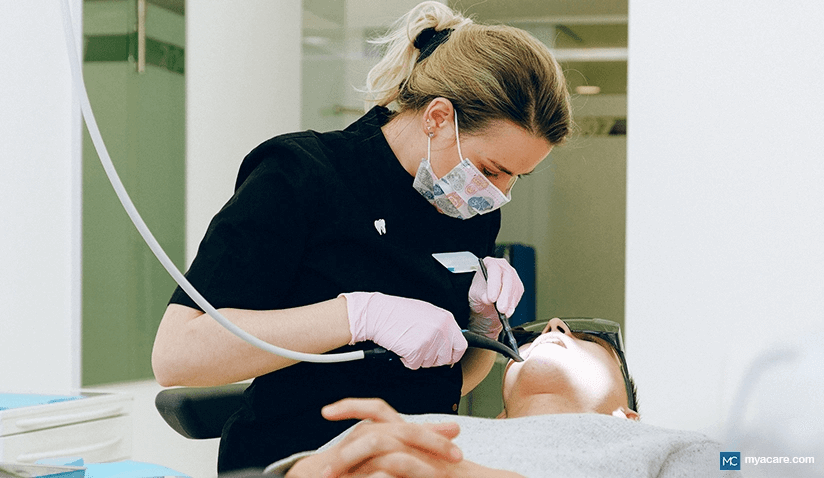When Does Dental Tourism Make Financial Sense?

Dental tourism is gaining popularity among residents of developed countries. It involves traveling to cheaper countries for dental treatment and vacationing at the destination. With increasing cost of dental treatment and limited insurance coverage, residents of developed countries, especially the US, Australia, and the UK, find it more lucrative to opt for dental tourism, even after considering the cost of the travel and accommodation.
For instance, people from the US save 50%-70% on dental treatments in Mexico, 45%-65% in Costa Rica, and 50%-75% in Thailand.
- Countries such as Thailand, Spain, Poland, Malaysia, Turkey, and India[1] are popular among US residents. Meanwhile, UK residents prefer traveling to Turkey.
In this article, we discuss benefits of dental tourism, factors to consider while choosing a clinic abroad, and drawbacks of dental tourism.
Why are people looking for dental work abroad?
Below are some of the reasons why people choose dental work abroad:
- Affordable dental treatments (For instance, dental implants in the US cost about 4,000 USD per tooth compared to 440-820 USD in India)
- A long waiting list to undergo treatment in own country
- Lack of dental insurance coverage in own country
- Access to high-quality treatment abroad at lower costs
- Inexpensive travel and accommodation charges
- Familiarity of other countries with the English language
Why is undergoing dental treatment abroad inexpensive?
The cost of living and minimum wage for skilled workers in other countries is much lower. Dentists also enjoy cheaper education and are less likely to have student debt compared to dentists in the US. Lower operating costs and student debt make it easier for foreign dentists to provide dental treatment at lower prices.
What are the benefits of undergoing dental treatment abroad?
Below are some of the benefits of undergoing dental treatment abroad:
- High-quality treatment from established dentists at a substantially lower cost
- Easy discovery and access to reputed clinics with state-of-the-art technology
- Minimal waiting time in clinics, as most of the treatments are pre-planned through virtual consultations
- Opportunity to travel and explore another country
When does dental tourism make financial sense?
Dental tourism makes financial sense when patients opt for extensive dental treatments. For instance, full mouth implants in the US cost ~20,000-45,000 USD. In India, the same treatment costs ~5,000-12,000 USD. Given the affordable travel and accommodation expenses and good flight connectivity, choosing India for dental implants in this situation will be a win-win situation for a patient.
Below are some of the extensive dental treatments for which dental tourism makes financial sense:
- Full mouth implants
- Invisible braces
- Advanced gum care
- Multiple root canals and crowns
- Digital smile designing
- Teeth whitening
However, traveling abroad for simple dental treatments such as fillings, cleaning of teeth, or single implant does not make financial sense.
Factors to consider while choosing a dental clinic abroad
Choosing a credible dental clinic abroad can be an uphill task. While it is easy to search dental clinics online, it can be challenging to authenticate details. A wrong choice may do more harm than good.
Here are some of the things that people should consider while seeking dental treatment abroad:
- Look for the expertise of the clinic and its accreditations online
- Check the qualifications, experience, and achievements of the dentist online or through any other source
- Contact the clinic to check if the desired procedure is performed
- Check for the reviews or testimonials of patients who underwent similar procedures
- Check out the facilities, equipment, and technologies used in the clinic
- Find out special provisions or arrangements to ensure post-treatment care
- Check if the language or cultural disparity serves as a barrier in communicating your concerns with the dentist or any other staff. Look for a translator if required
- Enquire if the international standards of infection control and sterilization protocols are followed
- Look for the total cost involved and the number of days required for the desired procedure
- Understand the legal system of the chosen destination. Invest in legal patient insurance or any other relevant documents
What are the drawbacks of dental tourism?
Below are some of the drawbacks of dental tourism:
- Dental treatments are streamlined and consolidated such that treatments are performed in fewer visits. The short duration of treatment may hinder the quality of dental work delivered
- Post-treatment complications are difficult to manage remotely once the individual reaches his home country
- Quality of education, training, materials used, and care delivered may not always meet international standards
- Malpractice laws vary between countries. So, there are limited options for litigation in extreme situations
- Language and cultural disparities may create difficulty in communicating with clinical staff
Conclusion
Dental tourism is a lucrative way to undergo cost-effective dental treatment along with holidaying at the chosen destination. But people should proceed with caution after evaluating all risks.
To search for the best dentists in Germany, India, Malaysia, Poland, Singapore, Spain, Thailand, Turkey, the UAE, the UK and the USA, please use the Mya Care search engine.
To search for the best healthcare providers worldwide, please use the Mya Care search engine.

Dr. Shilpy Bhandari is an experienced dental surgeon, with specialization in periodontics and implantology. She received her graduate and postgraduate education from Rajiv Gandhi University of Health Sciences in India. Besides her private practice, she enjoys writing on medical topics. She is also interested in evidence-based academic writing and has published several articles in international journals.
References:
Featured Blogs



